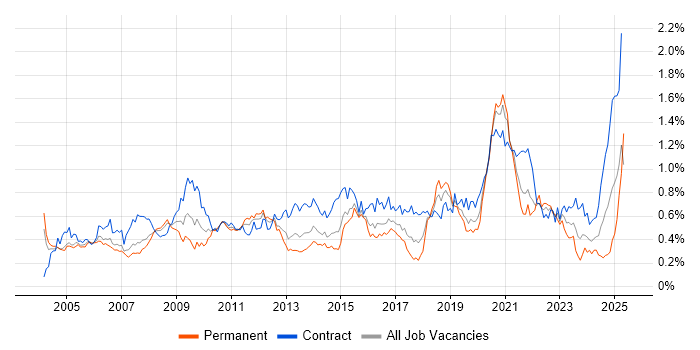Legacy System
Central London > City of London
The table below looks at the prevalence of the term Legacy Systems in permanent job vacancies in the City of London. Included is a benchmarking guide to the salaries offered in vacancies that cited Legacy Systems over the 6 months leading up to 30 May 2025, comparing them to the same period in the previous two years.
| 6 months to 30 May 2025 |
Same period 2024 | Same period 2023 | |
|---|---|---|---|
| Rank | 126 | 174 | 201 |
| Rank change year-on-year | +48 | +27 | +40 |
| Permanent jobs citing Legacy Systems | 11 | 9 | 28 |
| As % of all permanent jobs advertised in the City of London | 0.57% | 0.27% | 0.62% |
| As % of the Miscellaneous category | 1.39% | 0.78% | 1.52% |
| Number of salaries quoted | 10 | 1 | 23 |
| 10th Percentile | £57,000 | - | £48,400 |
| 25th Percentile | £66,250 | £66,250 | £50,000 |
| Median annual salary (50th Percentile) | £75,000 | £67,500 | £70,000 |
| Median % change year-on-year | +11.11% | -3.57% | -17.65% |
| 75th Percentile | £90,313 | £68,750 | £85,000 |
| 90th Percentile | £96,250 | - | £125,000 |
| Central London median annual salary | £75,000 | £80,000 | £60,000 |
| % change year-on-year | -6.25% | +33.33% | -29.41% |
All Generic Skills
City of London
Legacy Systems falls under the General and Transferable Skills category. For comparison with the information above, the following table provides summary statistics for all permanent job vacancies requiring generic IT skills in the City of London.
| Permanent vacancies with a requirement for generic IT skills | 794 | 1,152 | 1,847 |
| As % of all permanent jobs advertised in the City of London | 40.95% | 34.48% | 41.04% |
| Number of salaries quoted | 593 | 875 | 1,539 |
| 10th Percentile | £42,500 | £41,250 | £43,632 |
| 25th Percentile | £52,500 | £51,250 | £58,750 |
| Median annual salary (50th Percentile) | £75,000 | £72,500 | £77,500 |
| Median % change year-on-year | +3.45% | -6.45% | - |
| 75th Percentile | £102,750 | £97,500 | £105,000 |
| 90th Percentile | £145,000 | £117,500 | £120,000 |
| Central London median annual salary | £75,000 | £72,500 | £77,500 |
| % change year-on-year | +3.45% | -6.45% | +3.33% |
Legacy Systems
Job Vacancy Trend in the City of London
Job postings citing Legacy Systems as a proportion of all IT jobs advertised in the City of London.

Legacy Systems
Salary Trend in the City of London
3-month moving average salary quoted in jobs citing Legacy Systems in the City of London.
Legacy Systems
Salary Histogram in the City of London
Salary distribution for jobs citing Legacy Systems in the City of London over the 6 months to 30 May 2025.
Legacy Systems
Co-occurring Skills and Capabilities in the City of London by Category
The follow tables expand on the table above by listing co-occurrences grouped by category. The same employment type, locality and period is covered with up to 20 co-occurrences shown in each of the following categories:
